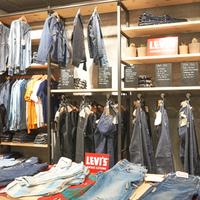People buy jeans again – level 2
Individuals|purchase|jeans|once more|beginner
||청바지|다시|
||vaqueros||
||dżinsy||
Menschen kaufen wieder Jeans - Stufe 2
People buy jeans again – level 2
La gente vuelve a comprar vaqueros - nivel 2
Les gens achètent à nouveau des jeans - niveau 2
La gente compra di nuovo i jeans - livello 2
人々は再びジーンズを買う – レベル 2
청바지를 다시 사는 사람들 - 레벨 2
Ludzie ponownie kupują dżinsy - poziom 2
As pessoas voltam a comprar calças de ganga - nível 2
Люди снова покупают джинсы - уровень 2
İnsanlar tekrar kot pantolon satın alıyor - seviye 2
Люди знову купують джинси - рівень 2
人们再次购买牛仔裤——2级
人们再次购买牛仔裤——2 级
人們再次購買牛仔褲——2級
As governments ease coronavirus rules, people are going out and they are returning to their normal social lives.
|правительства|ослабляют||||||||||||||социальной|жизни
As governments|governments|relax|coronavirus|restrictions|individuals|verb|venturing|socializing|and also|people||going back|to|people's|regular|social interactions|social activities
|die Regierungen|lockern|Coronavirus||||||||||||||
||완화하다||규칙|||||||||||||
||放宽|||||||||||||||
|rządy|łagodzić|koronawirus|||||||||wracają|||||
|政府|緩和する|コロナウイルス||||||||||||||
|gobiernos|alivian|coronavirus|normas||||||||regresando|||normal||
Während die Regierungen die Coronavirus-Regeln lockern, gehen die Menschen wieder nach draußen und kehren zu ihrem normalen sozialen Leben zurück.
A medida que los gobiernos flexibilizan las reglas del coronavirus, la gente está saliendo y volviendo a sus vidas sociales normales.
政府がコロナウイルスの規制を緩和するにつれて、人々は外出し、通常の社会生活に戻りつつあります。
По мере того, как правительства смягчают правила борьбы с коронавирусом, люди выходят из дома и возвращаются к своей обычной социальной жизни.
随着政府放宽冠状病毒规则,人们开始外出并恢复正常的社交生活。
People are returning to shops, and the demand for some products is rising.
|||||||demand|||||increasing
|||||||Nachfrage|||||steigt
||돌아가고 있다||상점|||수요|||제품||증가하고 있다
|||||||需求|||||
||||tiendas|||demanda|||productos||
|||||||popyt|||||wzrasta
Die Menschen besuchen wieder Geschäfte, und die Nachfrage nach einigen Produkten steigt.
La gente está regresando a las tiendas, y la demanda de algunos productos está aumentando.
人々が店に戻ってきており、一部の製品の需要が高まっています。
Люди возвращаются в магазины, растет спрос на некоторые товары.
人们正在重返商店,对某些产品的需求正在上升。
Levi Strauss is an American company and a global leader in jeans clothing.
Леви|Страус|||||||||||
|||||||||leader|||
Levi|Strauss|||||||||||
||||||||||||의류
Levi Strauss|Strauss|||estadounidense|empresa|||mundial|líder mundial|||
リーバイス|ストラウス|||||||グローバル|リーダー|||
Levi Strauss|Strauss|||||||||||odzież dżinsowa
Levi Strauss ist ein amerikanisches Unternehmen und ein globaler Marktführer in der Jeansbekleidung.
Levi Strauss es una empresa estadounidense y líder mundial en ropa vaquera.
リーバイ ストラウスはアメリカの会社で、ジーンズ衣料の世界的リーダーです。
Levi Strauss - американская компания, мировой лидер в производстве джинсовой одежды.
Levi Strauss 是一家美国公司,也是牛仔裤服装的全球领导者。
The company´s revenues in the last three months rose by 41%.
|||revenue||||||rose|
|||Umsatz||||||stieg|
|||수익|||||||
||los ingresos aumentaron|Ingresos|||||meses|aumentaron|
|||収益|||||||
|||przychody firmy||||||wzrosły|
Los ingresos de la empresa en los últimos tres meses aumentaron un 41%.
Pendapatan perusahaan dalam tiga bulan terakhir naik 41%.
過去 3 か月間の同社の収益は 41% 増加しました。
Выручка компании за последние три месяца выросла на 41%.
该公司过去三个月的收入增长了 41%。
Many clothing manufacturers have factories in Vietnam, where the pandemic caused many factories to close.
|clothing|||factories|||where|||caused||||
||Hersteller||||Vietnam||||||||
||제조업체||||||||때문에||||
||||||越南||||||||
||producenci odzieży||fabryki||||||||||
||製造業者||||ベトナム||||||||
|industrias de la|fabricantes de ropa||fábricas||Vietnam||||||||
Muchos fabricantes de ropa tienen fábricas en Vietnam, donde la pandemia hizo que muchas fábricas cerraran.
多くの衣料品メーカーは、パンデミックにより多くの工場が閉鎖されたベトナムに工場を持っています。
У многих производителей одежды есть фабрики во Вьетнаме, где из-за пандемии многие фабрики закрылись.
Багато виробників одягу мають фабрики у В'єтнамі, де пандемія призвела до закриття багатьох підприємств.
It did not happen to Levi Strauss.
|||||Леви|
|||happen|||
|||일어나다|||
||||||Levi Strauss
No le sucedió a Levi Strauss.
それはリーバイ・ストラウスには起こりませんでした。
С Levi Strauss этого не произошло.
Levi Strauss 并没有发生这种情况。
The person Levi Strauss was born in Germany in 1829, and he started his business in San Francisco, California, in 1853.
|||||||||||||||Сан|Франциско|Калифорния|
|||||||||||||||San Francisco|San Francisco||
|La persona||||nació||Alemania||||||||San Francisco||California|
La persona Levi Strauss nació en Alemania en 1829, y comenzó su negocio en San Francisco, California, en 1853.
リーバイ・ストラウスという人物は、1829 年にドイツで生まれ、1853 年にカリフォルニア州サンフランシスコで事業を開始しました。
Леви Штраус родился в Германии в 1829 году, а в 1853 году открыл свой бизнес в Сан-Франциско, штат Калифорния.
李维·施特劳斯 1829 年出生于德国,1853 年在加利福尼亚州旧金山开始创业。
It was the first company which made blue jeans.
||||||||jeans azules
Fue la primera empresa que fabricó jeans de tela vaquera.
ブルージーンズを最初に作った会社です。
At that time, only workers wore them, who were mainly miners.
|||||носили||||в основном|шахтёры
|||||||who|were|primarily|miners
|||||입었다||||주로|광부
|||solo|trabajadores|llevaban||||principalmente mineros|mineros
||||労働者||||||鉱夫
||||robotnicy|nosili||||głównie|górnicy
Zu dieser Zeit trugen sie nur Arbeiter, die hauptsächlich Bergleute waren.
En ese momento, solo los trabajadores los usaban, que eran principalmente mineros.
当時は、主に鉱山労働者である労働者だけが着用していました。
В то время их носили только рабочие, в основном шахтеры.
Тоді їх носили лише робітники, переважно шахтарі.
Difficult words: ease (to make something easier or less), demand (when people want to buy something), revenue (money which a company gets from its business).
difficult|words|make easier||||easier||less|demand|when||||||revenue||||||||
||쉬움|||||||수요|||||||수익||||||||
||轻松||||||||||||||收入||||||||
||||||más fácil||menos||||||||Ingresos de empresa||||||||
||||||||||||||||収益||||||||
||||||||||||||||przychód||||||||
Schwierige Wörter: Leichtigkeit (etwas einfacher oder weniger machen), Nachfrage (wenn Menschen etwas kaufen möchten), Einnahmen (Geld, das ein Unternehmen aus seinem Geschäft erhält).
Palabras difíciles: facilidad (hacer que algo sea más fácil o menos), demanda (cuando las personas quieren comprar algo), ingresos (dinero que una empresa obtiene de su negocio).
Kata-kata yang sulit: kemudahan (untuk membuat sesuatu menjadi lebih mudah atau lebih sedikit), permintaan (ketika orang ingin membeli sesuatu), pendapatan (uang yang diperoleh perusahaan dari bisnisnya).
難しい言葉: 容易さ (何かをより簡単に、またはより少なくすること)、需要 (人々が何かを購入したいとき)、収益 (会社がビジネスから得るお金)。
Сложные слова: облегчить (сделать что-то проще или меньше), спрос (когда люди хотят что-то купить), выручка (деньги, которые компания получает от своего бизнеса).
You can watch the original video in the Level 3 section.
вы|||||||||
Sie können das Originalvideo im Abschnitt Level 3 ansehen.
Puedes ver el video original en la sección de Nivel 3.
Оригинальное видео можно посмотреть в разделе "Уровень 3".

